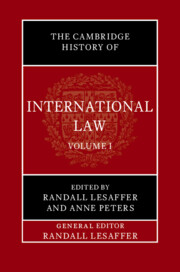Book contents
- The Cambridge History of International Law
- The Cambridge History of International Law
- Frontispiece
- The Cambridge History of International Law
- Copyright page
- Contents
- Plates
- Tables
- Contributors
- Preface
- 1 Scope, Scale and Humility in the History of International Law
- Part I The Historiography of International Law
- 2 A Thousand Flowers Blooming, or the Desert of the Real?
- 3 Political Thought and the Historiography of International Law
- 4 The Turn to the History of International Law in the Field of International Relations
- 5 Economic History and International Law
- Part II The Historiography of International Law
- Index
- Plate Section (PDF Only)
- References
4 - The Turn to the History of International Law in the Field of International Relations
from Part I - The Historiography of International Law
Published online by Cambridge University Press: 06 December 2024
- The Cambridge History of International Law
- The Cambridge History of International Law
- Frontispiece
- The Cambridge History of International Law
- Copyright page
- Contents
- Plates
- Tables
- Contributors
- Preface
- 1 Scope, Scale and Humility in the History of International Law
- Part I The Historiography of International Law
- 2 A Thousand Flowers Blooming, or the Desert of the Real?
- 3 Political Thought and the Historiography of International Law
- 4 The Turn to the History of International Law in the Field of International Relations
- 5 Economic History and International Law
- Part II The Historiography of International Law
- Index
- Plate Section (PDF Only)
- References
Summary
This chapter focuses on the recent (re)turn to history in scholarship of international relations (IR) on international law. We argue that two interrelated trends explain this development. The first is primarily internal to the field, where historically sensitive approaches have gained ground over the past thirty years. The second is external and the result of IR scholars’ productive engagement with debates in other fields, including global history, intellectual history and legal history. Although the new historical IR work on international law remains heavily indebted to histories produced outside the confines of the discipline, IR scholars at the vanguard of this movement are increasingly comfortable with writing histories themselves. New IR historical accounts have thus emerged, spanning broad subjects of international society, order and transformation, as well as specific areas of international law, including human rights, humanitarian law and international organisations. We review the history of the disciplinary divide between IR and legal history, outline how IR theoretical approaches have made use of history, highlight some of the thematic areas of the new IR historical work, and lay out possible future research directions.
Keywords
- Type
- Chapter
- Information
- The Cambridge History of International Law , pp. 136 - 161Publisher: Cambridge University PressPrint publication year: 2024

